Your Shopping Bag
Easy Zero-Waste Ideas for the Home

Ever wondered how you can jump on the zero-waste bandwagon at home? Here we go through budget-friendly tips on how to take small baby steps to the zero-waste lifestyle.
Beeswax instead of cling film
Say goodbye to cling film and hello to its sustainable, environmentally friendly (and better looking) cousin! Beeswax is a fantastic alternative to cling film for more than its durability. Beeswax wraps are breathable, meaning it helps food stay fresh for longer, as opposed to cling film.
Each beeswax wrap can last for up to a year with proper care and usage, making them perfect for lunches and leftovers alike. Plus, they come in a variety of patterns and support the bees, so you can do the right thing for the environment and our favourite – and essential – pollinators!
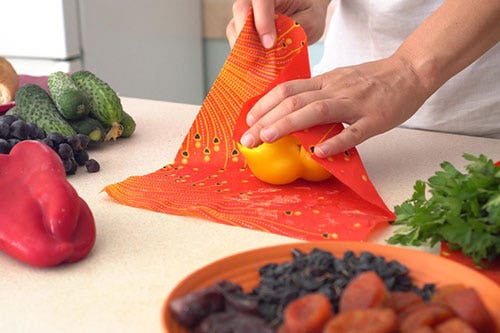
Support your local farmer
Farmers’ markets are easily sought out even among the tiniest of villages. Supporting your local farmers and artisans is a wonderful way to help the environment. Many of these small businesses are also dedicated to the zero-waste movement, so are more likely to offer environmentally friendly packaging.
Supporting local farmers means that you’re cutting out the carbon emissions from freight transport and not giving your hard-earned money to big corporations. This way, you can enjoy your seasonal fruits and veggies the way they’re supposed to be enjoyed, and the farmers and artisans can continue to earn a good living doing what they love best in a fair trade and sustainable manner.
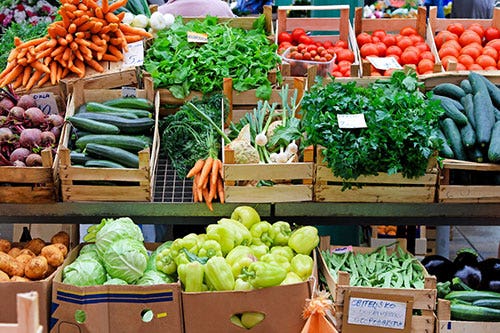
DIY reusables
Get crafty and make a bunch of reusable makeup remover pads, handkerchiefs, tea bags, baby wipes, feminine hygiene products and kitchen towels – the list goes on! All of these are relatively easy to make and require little to no experience.
If you’re stuck for inspiration, Pinterest is just a few clicks away from sparking an idea or two! These also make wonderful little gifts for those around you.
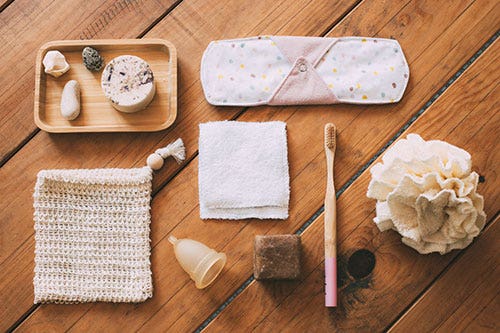
Produce bags
If you’re experienced in crafting and know how to wield a crochet hook, a pair of knitting needles, or you’re a macrame machine, why not craft some produce bags to take with you when you go shopping? Perfect for carrying fresh fruits and veg, you won’t need those small plastic bags that take up precious space in landfill.
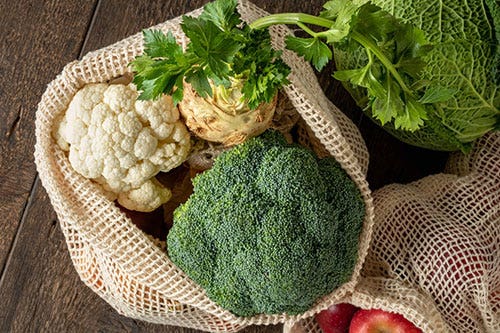
Compost bin (and bonus bokashi tips)
Did you know that decomposing food produces methane, which is 50 times more concentrated than carbon dioxide? We’re just throwing our food away willy-nilly into landfill and doing irreparable harm to our planet. In fact, it’s crazy how much we actually throw away without realising!
Grab a simple container for your kitchen counter that can be used as a compost bin. This is perfect for any discarded fruits, vegetables, loose tea and coffee grounds. This way, you can make your own nutrient-rich compost to plant flowers or even vegetables in! Just be careful to not discard meats, dairy, fats and oils or pet waste, as this will hinder the compost process and attract unwanted critters.
If you’re super green-fingered, you may want to invest in a bokashi bin. This little wonder is a small bin for compost with a tap on it, which dispenses a greatly concentrated liquid that’s nutrient-rich (and free) food for your plants! Mix 10ml of this liquid with a litre of water and your plants will thrive.
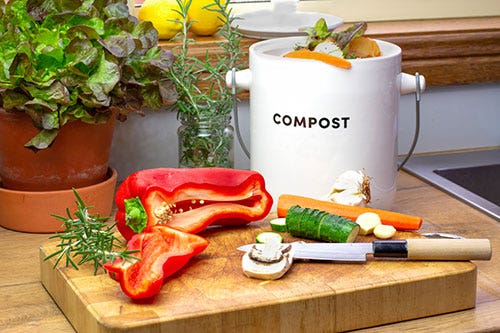
Regrow your veggies
If you didn’t know, you can regrow your spring onions in 4 days if you leave them in a glass of water. No, seriously! There are so many other vegetables you can grow from your windowsill in a jar of water, such as celery, Romaine lettuce, bok choy, cabbage, basil, mint and coriander. Just remember to change the water every couple of days.
You can also regrow sweet potatoes and regular potatoes from offcuts. We’ve all found that one potato in the back corner of a dark cupboard that looks like something from the Alien movie franchise. Simply take this supernatural-looking creature and pop it in some soil or slice a part of a potato and plant with the skin side facing up. Forget about it for a while, then harvest your own potatoes a couple of months later!
As a bonus, potatoes are super fun to grow, as one potato can create up to five whole potatoes from one single offcut! Potato farming is pretty much like finding buried treasure – and by treasure, we mean carbohydrates!
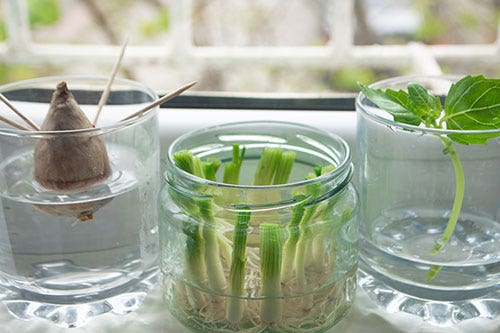
There are more ways to become more environmentally friendly around the home, so why not share yours in the comments? If you’ve ever wondered how to ease yourself into a greener life – now you can with these top tips to save our planet.
Here’s to going green!
Joe
















